
24 Sci-Fi and Fantasy Books to Look Forward to in 2024
Exciting New Series’ and Standalones From Kelly Link, Lev Grossman, Sofia Samatar, James S.A. Corey, and More
It seems impossible that 2024 could outdo what was truly a spectacular year of SFF and speculative offerings. But considering how difficult it was to narrow down this preview, you and I are in for a treat this year. We’ve got alternate-history utopian nations and near-future dystopian surveillance states, sexy wedding duels and interstellar artifact heists, daring works in translation and new takes on familiar archetypes. And the characters—get ready to meet vengeful ghosts and body-hopping mothers-to-be, pirates and aliens and time traveler “bridges,” river goddesses and accidental generation ship saints. Let’s scale that TBR together.
*
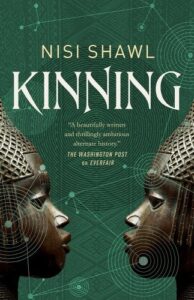
Nisi Shawl, Kinning
(Tor Books, January 23)
I can’t think of a better way to kick off 2024 than with Nisi Shawl’s steampunk alternate history epic about the formation of Everfair, a utopian nation within the borders of the Congo Free State. Following the eponymous first novel in 2016, Everfair has reached a tentative peace among its clashing factions, from England’s Fabian Society to Black missionaries to the royals whose land was annexed as a European colony, however well-meaning.
But while Princess Mwadi and Prince Ilunga attempt to seize the throne their father abdicated, influenza beyond Everfair’s borders has weakened rival powers in Europe. Could the solution lie in empathy spores—one of Everfair’s many magical inventions—that Chinese scientist Tink is distributing around the world via aircanoe? The Everfair sequel looks to replicate the first book’s success (both within and without the central story) in creating bonds between small groups that have global effects.
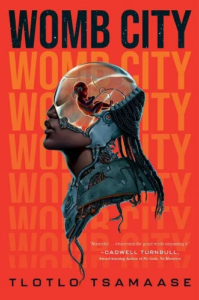
Tlotlo Tsamaase, Womb City
(Erewhon Books, January 23)
Womb City is one of those books I’ve been waiting nearly a year for, so I’m thrilled for Motswana writer Tlotlo Tsamaase’s Africanfuturist debut to finally be here. Obviously the title concerns a world in which babies are grown in artificial wombs, but this science fiction horror tale is about so much more than the future of fertility; it’s set in a surveillance state in which consciousnesses can body-hop, but only if they agree to be monitored at all times.
Such is the case for Nelah, who is on her third lifetime but in a loveless marriage, with a gestating daughter held as collateral for her not stepping out of line. But when a night of indiscretions culminates in a car accident cover-up, Nelah finds herself responsible for another life of sorts: the ghost of her victim, which demands revenge on everyone close to Nelah.
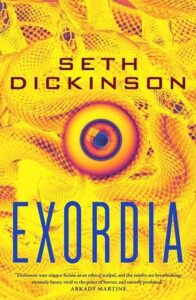
Seth Dickinson, Exordia
(Tordotcom Publishing, January 23)
While I breathlessly await the next installment of Seth Dickinson’s heartrending geopolitical fantasy series about Baru Cormorant, I’m delighted to see that he’s playing in the sci-fi sphere in the meantime. Exordia is an expletive-laden first-contact story between Kurdish genocide survivor Anna Rekani and Ssrin, an eight-headed viper alien that only she can see. With vibes of Independence Day (except where the extraterrestrials are at least our frenemies) and Michael Crichton, this bonkers-sounding adventure is high-concept, horrific, and perfect to fill the Baru-sized hole in my TBR.
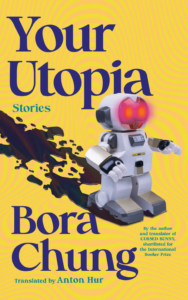
Bora Chung (trans Anton Hur), Your Utopia: Stories
(Algonquin Books, January 30)
Korean author Bora Chung’s second collection (after the Booker Prize-shortlisted Cursed Bunny) contains eight new speculative tales, perhaps a bit more tender but no less haunting. There are stories of one-sided love, from a husband tracing his wife’s late-night phone calls in “A Very Ordinary Marriage” to an AI elevator falling for its riders in “One More Kiss, Dear.” We follow along with a bottom-rung employee at “The Center for Immortality Research” who still has better job security than most of us (if the same boss forever is your sort of thing). And it should come as no surprise that the title story’s utopia is one in which AI has replaced humanity, though there is still a humanoid robot asking existential questions into the void.
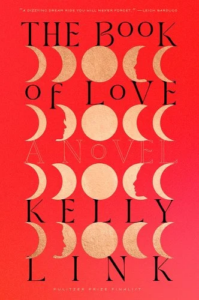
Kelly Link, The Book of Love
(Random House, February 13)
Kelly Link is a Pulitzer Prize finalist and MacArthur Genius Grant recipient for her fantastical short fiction, with her debut novel long anticipated. In the New England town of Lovesend, three teenagers who have been missing for months find themselves resurrected from the dead by their music teacher, Mr. Anabin, who has also brought back a mysterious traveler. But there’s a catch: two get to remain, and two will have to return to wherever they came from. Perform the magical tasks Mr. Anabin assigns, and they’ll have their second chance. But as the teens undertake this bargain of unfinished business, Lovesend itself begins transforming into something more extraordinary.
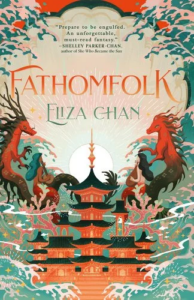
Eliza Chan, Fathomfolk
(Orbit Books, February 27)
Water-based worlds has become its own SFF subgenre, but often it’s humanity adapting to inhabit the waves; Eliza Chan instead submerges us into a world populated by fathomfolk, or all of the sirens, sea witches, and water dragons you would expect but don’t always get to hear about. But humanity is polluting the waters, forcing fathomfolk like Nami (daughter of the water dragon matriarch) onto land and into the dry sphere of two-leggers who regard them with the usual human amount of prejudice for someone not like them. In the half-flooded city of Tiankawi, reunited with her ambassador brother and his half-siren partner, Nami begins to better understand how fathomfolk live on the fringes—and why rebellion calls to them like an irresistible song.
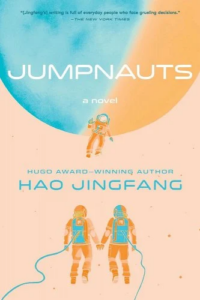
Hao Jingfang (trans Ken Liu), Jumpnauts
(Saga Press, March 12)
In 2016, Hao Jingfang won the Hugo Award for her novelette Folding Beijing (translated by Ken Liu), in which Beijing literally folded itself into different permutations in order for three social classes to share the same surface at different times. Now, her debut novel looks to examine similar class and cultural factions, with the Pacific League of Nations competing with the Atlantic Division of Nations over who will make first contact with an alien civilization that has already been hiding on Earth for thousands of years. The fact that Jumpnauts is listed as part of the Folding Universe makes you wonder if she will employ the same imaginative physics to how humans and aliens finally interact.

John Wiswell, Someone You Can Build a Nest In
(DAW, April 2)
John Wiswell is a writer new to me as I’ve been reading more deeply into SFF short fiction in the past year, but it’s no surprise he has an extensive body of work, with standouts like “D.I.Y.” and “So You Want to Kiss Your Nemesis.” That sense of initial irreverence belying deeply-considered pathos is reflected in his debut novel, an unflinchingly dark and unflinchingly heartfelt romance between a monster-hunter and her prey—but from the perspective of the monster, who’s seeking a mate in which to lay her eggs. For Shesheshen, having her young devour her partner from the inside out is the ultimate expression of love; but Homily, who doesn’t know the true identity of the mysterious woman she nursed back to health, might not appreciate things. I’m ready for Wiswell to convince us why they’re meant to be.
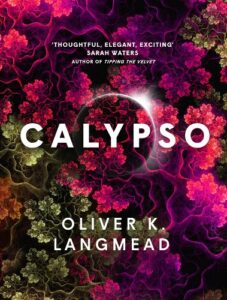
Oliver K. Langmead, Calypso
(Titan Books, April 2)
I’m a sucker for a generation ship story where the protagonist awakens far enough into the ship’s future that entire eras have passed—that the descendants hardly resemble the people who first boarded on Earth, and they have created their own culture and beliefs in a figurative and literal vacuum. Oliver K. Langmead’s latest really commits to that idea, with Rochelle waking from cryostasis into a lush forest. It’s fitting for an ark named after the mythical nymph Calypso, who kept Odysseus on her island for seven years during The Odyssey. And while Rochelle’s initial assignment was to be Calypso’s engineer, instead the forest’s inhabitants revere her as some sort of saint. Combine this with Langmead’s use of epic verse, and a blurb from Fingersmith author Sarah Waters, and how can anyone resist?
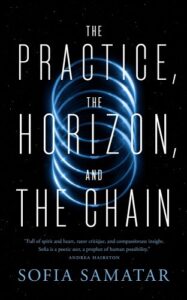
Sofia Samatar, The Practice, the Horizon, and the Chain
(Tordotcom Publishing, April 16)
Recent generation ship stories from authors like River Solomon have delved into the class and racial tensions of this phase of humanity’s migration through the stars. But what most intrigues me about Sofia Samatar’s science fantasy is that it has shades of R.F. Kuang’s Babel as well, interrogating the ivory tower of academia and how it can grant freedom via intellectual advancement, or withhold it from those not deemed deserving enough.
This novel’s mining ship left Earth long enough ago that its people are embedded within a centuries-old caste system, with much of the population Chained to the Hold. But when a Chained boy is brought “upstairs” by a “professor” who sees potential in him, he enters the insular academic world of the ship, only to discover that it—and his mentor, whose own academic career is rooted in him succeeding—possesses its own damning chains.
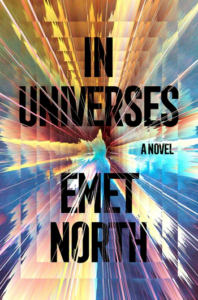
Em North, In Universes
(Harper, May 7)
Emet North sounds like the kind of writer who has lived a half-dozen lives before this, not least due to their physics thesis on the many-worlds interpretation of quantum mechanics. Their academic study has clearly influenced their fiction, with their debut novel following Raffi, a queer physicist distracted from their dark matter research by thoughts of Britt, an artist they barely know. But what if they knew her better?
Before Raffi realizes, they’re bouncing through parallel timelines and alternate realities, constantly changing the events of the summer they almost met Britt when they were both thirteen. Instead of strangers, they’re friends; instead of friends, they’re something more; instead of something more, Raffi betrays Britt. But which reality is the real one, and how does the past affect the present?
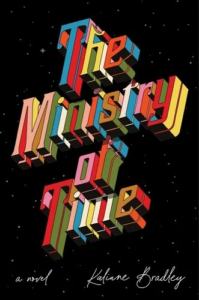
Kaliane Bradley, The Ministry of Time
(Avid Reader Press, May 7)
In Kaliane Bradley’s delightful-sounding novel, time travel is so bureaucratic as to be mundane, with civil servants who act as “bridges” to help the real time travelers (or “expats”) adjust from their era to ours. But what is supposed to begin and end with our protagonist acting as a host-slash-liaison for expat “1847,” a.k.a. an Arctic explorer, the two become unlikely roommates and even begin to fall in love. The fish-out-of-water time traveler relationship, not to mention the workplace strictures against any personal interactions, is giving vibes of Outlander meets Severance, with other expats including a spy who keeps getting plastic surgery and a 17th-century cinephile who gets addicted to dating apps.
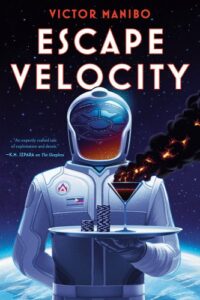
Victor Manibo, Escape Velocity
(Erewhon Books, May 21)
Victor Manibo’s debut novel The Sleepless explored a very speculative case of the haves versus the have-nots—that is, those afflicted by a pandemic of insomnia and those who could still sleep at night. His deliciously tense follow-up looks to twist the knife on those class tensions; it’s literally being billed as “Knives Out in space with a Parasite twist.”
At the twenty-fifth high school reunion held on the luxurious Space Habitat Altaire, a quartet of alums aren’t just looking to impress each other with their enviable lives. One is trying to solve a murder from senior year, another is collecting blackmail secrets (how Clue!), a third is angling for a coveted position on the Mars settlement to which Earth’s rich and famous are fleeing… and, OK, the fourth is trying to win the heart of his high school crush, aww. This looks like one of the year’s most fun SF mysteries.
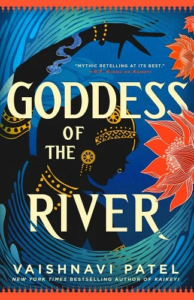
Vaishnavi Patel, Goddess of the River
(Redhook, May 21)
After reinventing the “wicked stepmother” of the Ramayana into a diplomat-queen in Kaikeyi, Vaishnavi Patel turns her gaze to another reimagining, this time of the Mahabharata: River goddess Ganga is cursed with a mortal body, forced to atone for the antics of the godlings on her shore. But her human life ebbs and flows with triumph and tragedy, as she becomes a powerful queen but also a mother who is forced to abandon her infant son. As he grows up, prince Devavrata carries his mother’s curse, and their fates intertwine and separate over the course of both their lifetimes.
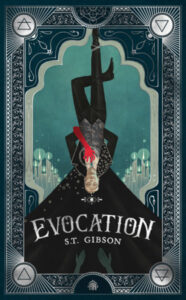
S.T. Gibson, Evocation
(Angry Robot Books, May 28)
Neither urban fantasy nor millionaire protagonists are usually my thing, but S.T. Gibson’s combination of the two has, shall we say, invoked my interest. Mostly because Boston-based lawyer David Aristarkhov has inherited both his family’s fortune and their rumored magical powers from a thousand-year-old deal with the Devil, yet he’s still an alcoholic former psychic prodigy who can barely manage moonlighting as a medium.
When the Devil comes to collect on the family’s long-ago bargain, David must excavate the other failed portion of his life: turning to his ex Rhys, a rival within their magical Society, for help. But working with Rhys involves grappling with his astronomer wife Moira—and despite himself, David finds himself attracted to them both. A polyamorous love story definitely sweetens the deal… if David can make it to his thirtieth birthday before the Devil steals him away from potential happiness.

Alexandra Rowland, Running Close to the Wind
(Tordotcom Publishing, June 11)
It’s fun to watch an author play within the bounds of their own world but with such different tones. Last year’s A Taste of Gold and Iron was a swoony fantasy romance set in the realm of Arasht, but this next installment is a swashbuckling queer pirate adventure on the high seas. The requisite newbie to the pirate crew is Avra Helvaçi, formerly of the Araşti Ministry of Intelligence, who steals the ultimate secret to sell on the black market. But his ex, pirate Captain Teveri az-Ḥaffār, has other plans to ferry the secret to the Isle of Lost Souls for an even greater booty.
Well, the real booty belongs to Brother Julian, the hot celibate monk who’s part of their ragtag crew. Alexandra Rowland has written the ideal antidote to the past indeterminate number of awful years, as well as a cure for the Our Flag Meets Death hiatus. What’s more, they tweeted, it’s not just funny in the way that Terry Pratchett’s work was funny, but “also angry in the same way that Terry Pratchett was angry.” All aboard!
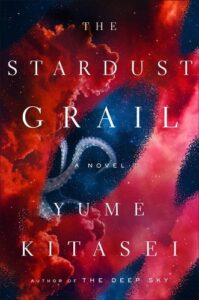
Yume Kitasei, The Stardust Grail
(Flatiron Books, June 11)
I really enjoyed Yume Kitasei’s generation ship debut The Deep Sky, but I’m even more sold on the premise of her second novel: Maya Hoshimoto is an intergalactic reverse Indiana Jones-meets-Debbie Ocean, which is to say she’s a former art thief renowned for stealing back alien artifacts. At least, until she retired to pursue a graduate degree in anthropology. But when an old friend approaches with one last score, Maya is powerless to resist. Better yet, tracking down an extraterrestrial object that may save an entire species from extinction might also solve the mystery of why Maya is seeing visions of the future—like the fact that someone will betray her on this final heist.
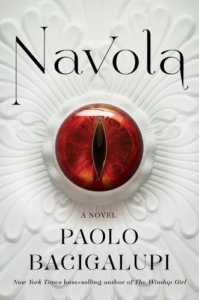
Paolo Bacigalupi, Navola
(Knopf, July 9)
I know Paolo Bacigalupi’s work through more futuristic novels like The Windup Girl and The Water Knife, tackling themes of bioengineering and global warming. Ironically that’s what has me even more intrigued for his latest, a historical epic fantasy that owes equal inspiration to Renaissance Italy and Game of Thrones. Davico di Regulai is the scion of one of the most powerful families in the city-state of Navola, who have clawed their way to prominence through their cunning as merchant bankers… though the family heirloom of a fossilized dragon eye probably deserves some credit, too. Expected to step up and run the di Regulai family, Davico must show that he knows how to navigate Navolese diplomacy, though even more crucial will be his willingness to delve into the dark history of how his adopted sister Celia di Balcosi was taken from her own decimated bloodline.
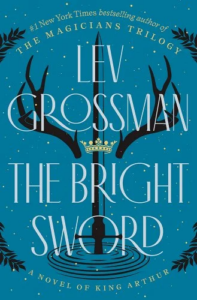
Lev Grossman, The Bright Sword
(Viking, July 16)
The eagerly anticipated next book from The Magicians author Lev Grossman shifts its classics-riffing focus from Narnia to Camelot… or rather, post-Camelot’s collapse. Freshly-forged knight Collum seeks to join the Round Table, but it’s (metaphorically) fractured, as King Arthur has fallen in battle two weeks prior and his idyllic kingdom is beset by warring factions.
There’s Morgan le Fay backed by an army of faeries and other supernatural creatures; Lancelot and Guinevere, grieving Arthur yet also regarded as traitors; and outsiders not part of Arthur’s fall, who sense an opportunity without an heir on the throne. Instead of joining the storied Knights of the Round Table, Collum will team up with a ragtag band of survivors including Sir Palomides and Sir Dagonet, as well as Merlin’s former apprentice (and betrayer, but for her own reasons) Nimue.
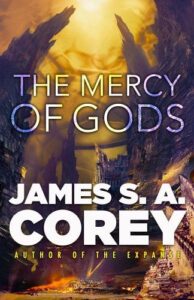
James S.A. Corey, The Mercy of Gods
(Orbit Books, August 6)
The Expanse authors Daniel Abraham and Ty Franck are collaborating once more on a new sci-fi trilogy that explores a different corner of the space opera universe, inspired in part by the Bible’s apocalyptic Book of Daniel. Dafyd Alkhor is a bright-eyed research assistant on the long-ago-settled human planet of Anjiin, but his world broadens beyond romantic and academic intrigue when he and a handful of other human survivors are snatched by the Carryx—an alien hive who kidnap species to their homeworld, only to pit them against one another in a competition for survival. While the idea of humanity justifying its continued existence is intriguing, I’m especially curious as to how humans made it off Earth in the first place; hopefully The Captive’s War trilogy will answer that and more.

Kerstin Hall, Asunder
(Tordotcom Publishing, August 20)
Kerstin Hall’s fiction delves into dark corners and underworlds that I might hesitate to enter as a reader, but I trust her enough to explore realms shaped by cannibalism (Star Eater) and populated by demons (The Border Keeper). To wit, I’m not usually a fan of eldritch tales, but I’m fascinated by her latest protagonist Karys Eska, a Deathspeaker whose power comes from one such nightmare being. But when a dying client pays Karys to investigate a suspicious demise and she accidentally binds him to her own shadow… a descent into the underworld seems all but inevitable.

August Clarke, Metal From Heaven
(Erewhon Books, fall TBD)
As excited as I am for H.A. Clarke to conclude their Scapegracers series with The Feast Makers in March, I’m even more psyched for the next phase of August Clarke’s literary career. They’ve signed a new book deal for three standalone novels, the first of which is an industrial fantasy whose setting was inspired by the steampunk anime Arcane: League of Legends but whose revenge plot is all Count of Monte Cristo. We don’t know much about it beyond the tantalizing pitch of a young woman presumed dead reinventing herself in a glittering world of industrial change in order to avenge her family’s murder by a ruthless mining company, but that’s all we need.

Freya Marske, Swordcrossed
(Bramble, fall TBD)
At the book launch for A Power Unbound, Freya Marske shared that her forthcoming standalone fantasy romance was equally inspired by the tradition of hiring a swordsman at your wedding and by the underrated queer romance Imagine Me & You, in which Piper Perabo falls for her wedding vendor Lena Headey. Now that Marske’s Edwardian-era magic series The Last Binding is complete, I can’t think of a better followup than this cozy romantasy about a wool merchant who hires a con artist to teach him swordplay for his nuptials, only to be seduced away from family obligations to a life where he can actually be himself, even if it’s with the last person he ever thought he’d love. Cross my heart, can’t wait to swoon over this one.
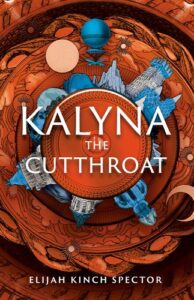
Elijah Kinch Spector, Kalyna the Cutthroat
(Erewhon Books, November 26)
My ruthless daughter Kalyna is back surviving and thriving in the sequel to Kalyna the Soothsayer. While her fake fortune teller shtick crumbled along with the demise of the Tetrarchic Experiment—four countries trying to coexist, only for the realm of Loasht to revoke peace—Kalyna has found a new application for her special set of skills: here, escorting a scholar-on-sabbatical back to his home country of Loasht amid the Tetrarchic tensions.
Partly narrated by the scholar (Radiant Basket of Rainbow Shells) himself, Elijah Kinch Spector’s latest adventure will see this motley crew joining up with the only people who will take them: a utopian community existing on the borders of Loasht and Tetrarchia. But if the Tetrarchic Experiment couldn’t succeed, we’re already suspicious of this cult and their seeming ability to have figured it all out. I can’t wait to see how Kalyna earns her new title.
Natalie Zutter
Natalie Zutter is a Brooklyn-based playwright and pop culture critic whose work has appeared on Tor.com, NPR Books, Den of Geek, and elsewhere. Find her on Twitter @nataliezutter.



















